Over the past several weeks, SexandRelationshipHealing.com webinar host and blogger Eddie Capparucci has given us a four-part series on “Becoming the New Guy.” This series has been extremely popular, and with the publication of the fourth and final installment earlier this week, it was suggested that perhaps we should create a single link that includes all four posts. This is that link. Plus, a big thank you to Eddie for sharing his incredible insight.
* * * * *
Eddie Capparucci, LPC, CSAS, CPCS
PART ONE
“Why should I believe him,” Brenda asked me about her husband, who told her he has not watched pornography for more than nine months. “Tell me why I should trust his man just because he tells me he’s no longer watching it. I have heard him make these claims many times, only to have my heart broken again and again because he was lying.”
Women like Brenda have every right to question the sincerity of their partners, especially if there has been a history of lying, deceit, and gaslighting. It is challenging for them to forget the painful falsehoods and give their partner yet another opportunity.
So how do you know if your partner is on the road to recovery from his struggle? I believe you need to see the ‘new guy’ in your relationship.
“It’s so hard to believe he is telling me the truth when I see so many of the same behaviors,” said Kelly of her husband Carl, who used to spend endless hours late at night webcamming with escorts. “He’s not online late at night anymore, but still lies about small things, he doesn’t help me around the house, he never talks, and the phone is always in his hand. He is the same guy, except he says he’s no longer chatting with sluts. Sorry, but I don’t buy it.”
And there you have it. Carl may no longer be engaged in video chatting, but he is the same guy who was being unfaithful to Kelly. It’s no wonder she doesn’t trust him when he says he has changed. Because with the exception of removing the destructive online behavior, he has done nothing to change and become the man she would like him to be.
So, what is going on here?
In my private practice, where I work exclusively with men struggling with sexual and pornography addictions, I have identified significant character deficiencies that I believe plague all of these men. Looking at the chart below, you can see eight key issues that prevent men from becoming the ‘new guy’ and experiencing rewarding and joyful relationships.
The characteristics I have identified are:
- Avoids emotional pain
- Lacks curiosity
- Struggles to connect
- Inwardly focused (selfish)
- Limited interests or passions
- Low emotional IQ
- Lacks mindfulness
- Unresolved childhood pain points
Based on my work with this client population, I estimate that 90% of men who struggle with compulsive sex and pornography display at least six of these characteristics, and this causes issues when trying to cultivate and maintain healthy relationships. Moreover, I always believe at the root of these issues is a lack of proper nurturing during the critical development years of childhood.
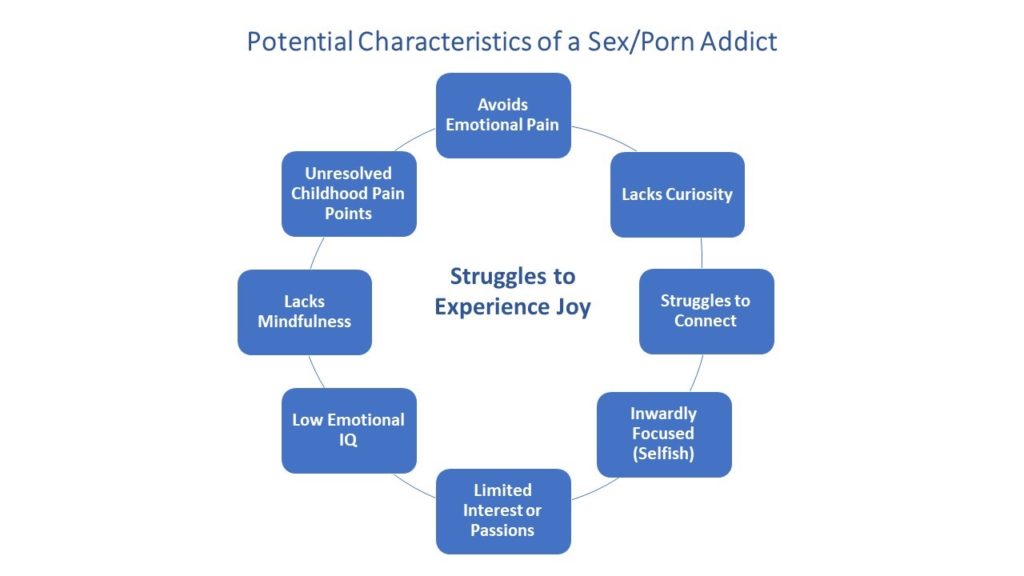 A vast majority of these men had parents who could not nurture them or teach them how to deal with emotional distress. Without that importance guidance, these individuals were left to determine on their own how to cope with emotional pain and provide themselves with comfort. As children, with thinking that is emotionally based and without vast worldly experiences, they came up with a simple solution to this dilemma – I won’t think about it. So they distracted themselves with too much television, fantasy play, food, etc. Somewhere along the way they stumbled across sexual activity and discovered this was the most effective of all forms of distractions and stimulation. And it soon became their go-to drug to eliminate emotional distress.
A vast majority of these men had parents who could not nurture them or teach them how to deal with emotional distress. Without that importance guidance, these individuals were left to determine on their own how to cope with emotional pain and provide themselves with comfort. As children, with thinking that is emotionally based and without vast worldly experiences, they came up with a simple solution to this dilemma – I won’t think about it. So they distracted themselves with too much television, fantasy play, food, etc. Somewhere along the way they stumbled across sexual activity and discovered this was the most effective of all forms of distractions and stimulation. And it soon became their go-to drug to eliminate emotional distress.
Now, as adults, they still run away from emotional pain with destructive behaviors such as compulsive sex and pornography.
Men who wish to experience real joy and happiness in their relationships need to work on the character issues outlined above. They must strive to become better men, husbands, fathers, sons, coworkers, and friends. And it all starts by working on these eight characteristics.
In the coming weeks, I will be breaking down each of these areas and outlining steps and tools that can lead to these men toward becoming the new guy.
PART TWO
So why is it that learning to manage your sexual or porn addiction is not enough when it comes to the changes needed in recovery?
I received the answer to that question many years ago. I was working with a client who had multiple affairs and had been in treatment for nearly a year. During that time, he had done everything required and had been sexually sober and faithful. One day his wife joined us in a session, and I asked if she was feeling more confident that he would remain faithful.
She sat forward on the couch and leaned toward me and said:
You are asking me if I believe the man sitting next to me has been faithful in the last 12 months. And the only reason I should believe that he hasn’t been is that he’s telling me he hasn’t. However, in the past, he always denied cheating and even told me I was being crazy because I was suspicious.
You need to understand this. I don’t see any other changes whatsoever in his behaviors toward the children or me. He’s still distant and moody. He also seems to be stuck in his head most of the time, not focusing on what we need. And his phone is always in his hand. So why should I trust him? The only difference is he telling me he is no longer unfaithful. And to me, that is not enough to believe.
My eyes were opened wide that day as I heard her concerns and realized that just helping men manage their sex or porn addiction is not enough.
Potential Characteristics of a Sex/Porn Addict
In the first article in this series, I introduced the potential characteristics of men struggling with sex or porn addiction (see chart below). These are character flaws I have seen time and time again in my private practice, and they are responsible for men being unable to develop and cultivate healthy relationships. More than 80% of men I have worked with have issues in seven or more of these critical growth areas.

Over the rest of this series, we will look more in-depth at these weaknesses and what is required to strengthen them. In this post, we look at the first three characteristics: avoids emotional pain; lacks curiosity; and struggles to connect.
Avoids Emotional Pain
At the heart of most addictions is unresolved emotional pain that is being covered up by addictive behaviors. This is especially true for those dealing with sex or porn addiction. The inability to sit and deal with emotional distress leads these individuals to distract themselves and seek comfort.
In most cases, this behavior was learned at an early age. Addicts, when struggling with emotional hurt as children, did not receive the nurturing required to learn how to deal with discomfort in healthy ways. No one ever explained to them it was OK to be upset by the hurtful event that occurred. Instead, they were left to figure out on their own how to rid themselves of their pain.
Having little in the way of worldly experiences and being more emotionally-based in their thinking, they come up with one logical conclusion – I will not think about it. And they do that by distracting themselves. Too much television, food, and fantasy are just a few examples of the tactics they utilize until they stumble across sex. With sex, they find what they perceive to be the greatest distraction of all.
Fast forward 20 years, and these adults are still caught in the same cycle of running away and distracting themselves. Why? Because they do not know how to manage emotional pain. So learning to tolerate and manage emotional pain this is a necessary change for men wanting to sustain their sexual integrity. They must learn that emotional distress, while uncomfortable, will not kill them. They also must understand the benefits that come with being able to deal with emotional pain in healthy ways.
Lacks Curiosity
You may be wondering why becoming more curious would be part of the growth chart for men struggling with sex or porn addiction. The reason is their lack of curiosity results in their inability to go deeper in relationships. In most cases, as children, no one challenged them to be curious about people. Today, as adults, they may be very curious about specific topics or interests, but that curiosity rarely extends to people.
Seeking knowledge about one’s partner and continuously trying to understand that person better strengthens relationships. It is through intimacy-building conversations that relationships flourish. Thus, some believe curiosity is the essential building block of emotional intimacy. And I can assure you that healthy emotional intimacy with one’s partner is an antidote to engaging in unwanted sexual behaviors.
Three keys to improving curiosity are asking open-ended questions, attentively listening instead of trying to formulate your response, and being engaged instead of merely being present. It does not take a lot to become curious, but it does take a desire to do so.
Struggles to Connect
The final character flaw we will examine in this post is the struggle to connect. Again, I find in my work with men that as children they did not have the relationship model where parents demonstrated the essential components of a healthy relationship. Often, there was little in the way of emotional nurturing taking place in the home, which left these kids learning about connecting from television and friends. Now imagine if they did not have friends.
Connecting in a relationship requires an individual to be emotionally available, and for these men, that is like a foreign language. As I tell my men, you would not know emotional intimacy if it hit you in the face. But it is not their fault; they only know what they know. So again, this is an opportunity for men to strengthen their relationship muscles. And the first lesson to learn is that physical intimacy is NOT emotional intimacy.
Typically, these men show their love and feel loved by touching and being sexual. That is why they will comment on how close they feel to their partner after engaging in sex. But physical intimacy is only part of a relationship. A healthy relationship is built on a foundation of emotional connection, with physical intimacy sprinkled in to reinforce the emotional aspect.
These men have it backward. They create the foundation on physical intimacy and sprinkle in emotions. It is no wonder so many spouses end up feeling used and violated.
Being emotionally connect with your partner is an antidote to managing your destructive sexual activities. And emotional connection starts by spending quality time with your partner – that means putting away the phone. It is trying to better know and understand your partner by being curious. It is being vulnerable and showing a side of yourself that you have locked away from the world. While that likely sounds incredibly frightening, it will be one of the most amazing experiences you will ever have in your life.
In part three of this series, we will examine being inwardly focused, limited interests or passions, and low emotional IQ.
PART THREE
In my previous article, we examined the character flaws of Avoiding Emotional Pain, Lacking Curiosity, and Struggling to Connect. This time we will look at the issues that can arise in a relationship when a man is Inwardly Focused, has Limited Interests or Passions, and possesses a Low Emotional IQ.
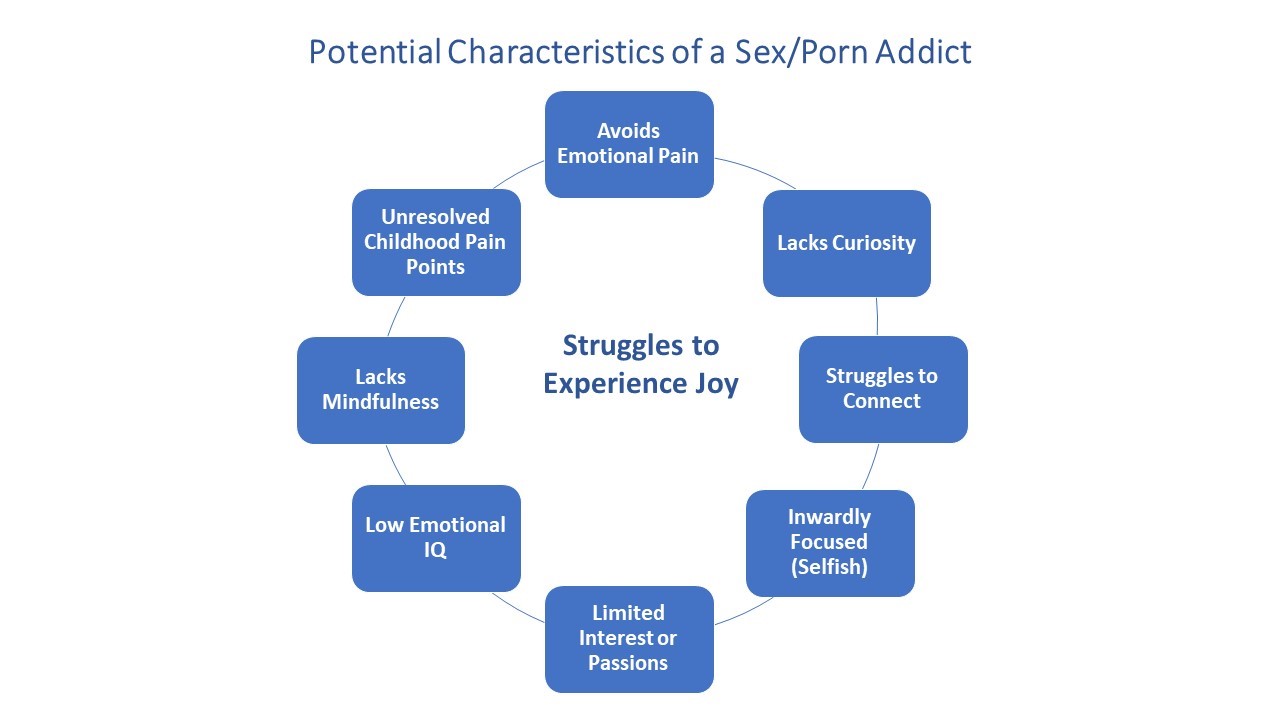
Inwardly Focused
My clients have often heard me say, “We have our heads down and we’re running through life oblivious to anything that doesn’t have something to do with us.” They all agree, but they all dislike hearing how selfish they have been and the pain it has caused themselves and others. Being inwardly focused makes it extremely hard for men to identify the needs, wants, and desires of those around them, especially their loved ones.
Again, this way of life, in part, was created during the early years of development when these individuals lacked the proper nurturing and direction required to be aware of others’ emotions. Instead, they lived for the most part in their own world but made their presence felt whenever an event occurred that resulted in stimulation.
The Inner Child Recovery Process (ICRP) teaches the importance of moving beyond oneself and shows individuals how to slow down, lift their heads, and notice the needs, wants, and desires of those around them. This requires addressing another character flaw that we will examine next time, Lacking Mindfulness. The objective with ICRP is to make life less about oneself and more about others.
Limited Interests or Passions
It is amazing how many of the individuals I work with tell me the same thing. I don’t have many interests and I have very few (if any) friends. In a way, this connects back to the lack of curiosity trait we discussed earlier. These men don’t challenge themselves to move beyond their comfort zone. They get stuck in routines, and that becomes their life.
As children, they were not challenged or taught how to explore and broaden their level of interests. These men can become very predictable and boring. In some cases, they are not living, they are simply existing. And that is why they are drawn to highly stimulating activities such as pornography.
A key factor to changing this flaw is for a man to engage in self-reflection regarding potential passions and issues. This can be a painstaking and lengthy process that requires researching and experimenting with activities that could develop into long-term passions. I can recall one client who, after an exhaustive search for a passion, got involved with archery and ended up participating in competitions.
Low Emotional IQ
A large majority of individuals who deal with a sex or porn addiction also have a difficult time emotionally connecting with others. The reason for this is they have an extremely low emotional IQ. In fact, 9 out of 10 men who I work with struggle in this area.
So, what is a low emotional IQ? These individuals have difficulty identifying emotions beyond anger, sadness, fear, or happiness. And those who can determine what they are really feeling cannot express it to others because they fear being vulnerable. Even worse, they experience strong anxiety when others try to share emotions with them. To deal with this, they minimize or try to fix the situation, which simply frustrates the other person.
With a low emotional IQ, it is impossible to forge a healthy and growing relationship filled with emotional intimacy. And it’s hardly a surprise that a lack of emotional intimacy is one of the leading factors for women who describe their relationships as being unsatisfying.
To strengthen his emotional IQ, a man must make a strong effort to emotionally engage rather than simply being physically present. He will also need to spend time processing and determining his true emotions, especially during moments when he is, on the surface, feeling anger, sadness, or fear. Creating emotional intelligence requires mindfulness (which, again, we will examine in the final part of this series) and curiosity (which we explored in part 2).
It is important to realize that strengthening your emotional IQ is a lifelong process. It does not happen overnight, and it can be challenging. But for those who persevere, the relationship benefits are off-the-chart.
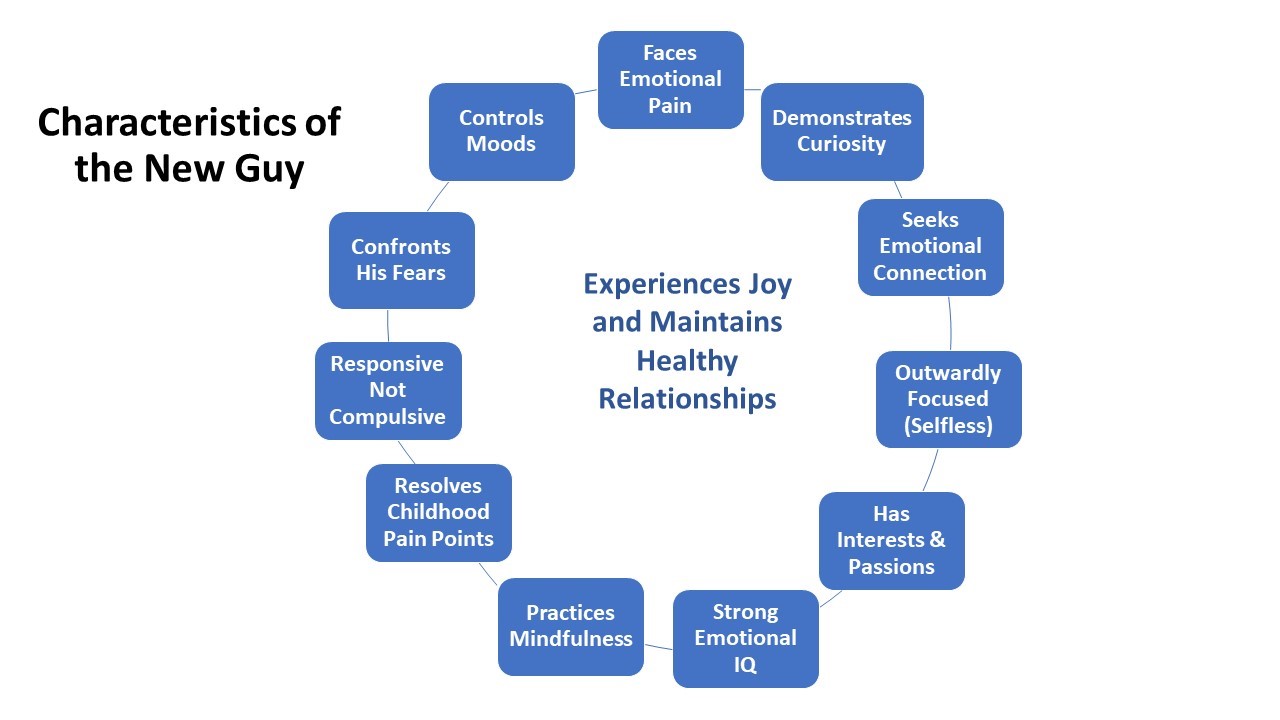
In the final part of this series, we will examine the character flaws involving Lack of Mindfulness, Impulsive Nature, and Fearfulness, while also discovering how Unresolved Childhood Pain Points contribute to the erosion of relationships.
PART FOUR
This is the final installment of our four-part series, where we have been examining the need to go beyond treating a man’s sexual or pornography addiction and tackle the character issues that impact his ability to cultivate healthy relationships. This method of transformation is part of the Inner Child Recovery Process (ICRP) for the Treatment of Sexual and Pornography Addiction.
In our last article, we examined the character flaws of being Inwardly Focused, having Limited Interests or Passions, and possessing a Low Emotional IQ. In this final article, we will examine the last three flaws involving Lack of Mindfulness, Compulsive Nature, and Fearfulness, while also discovering how Unresolved Childhood Pain Points and Mood Disorders contribute to an individual’s inability to connect.
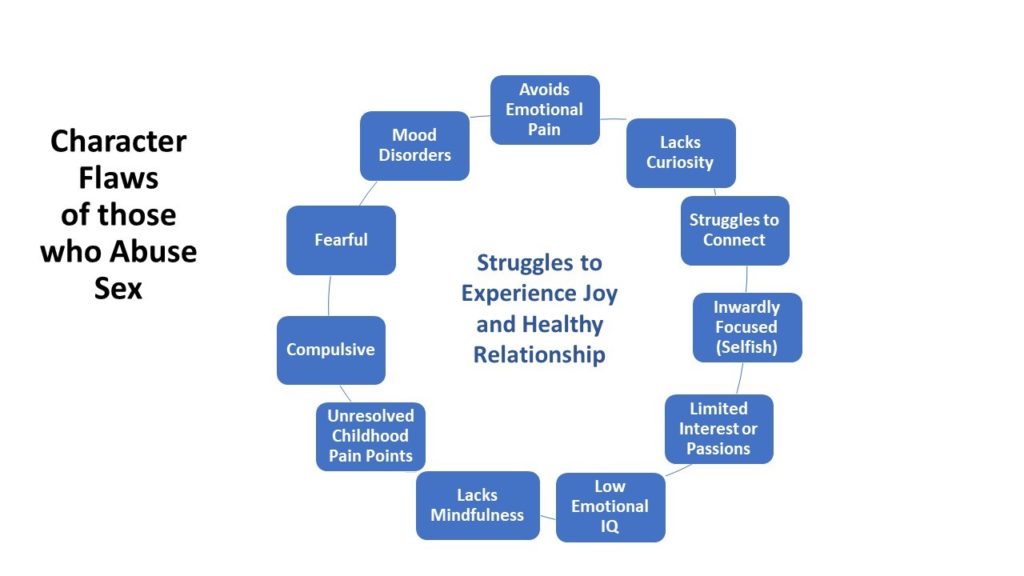
Lack of Mindfulness
A critical part of the ICRP is teaching individuals the art and benefits of being mindful. Mindfulness is being fully aware of your own experience in the present moment. And this is especially important when it comes to consistent evaluation of how we are feeling mentally, emotionally, physically, and spiritually. When individuals become depleted mentally, emotionally, physically, or spiritually, bad things can happen because the brain is screaming for stimulation or to numb-out.
Those struggling with addiction must learn to be mindful of emotional triggers, therefore allowing them to stay one step ahead of their addiction. Mindfulness also plays an essential role in helping individuals be more outwardly focused (which we discussed in the third part of this series). If you recall, individuals struggling with sex/porn addiction spend far too much time in their heads and, therefore, can be present but not engaged in the company of others. Mindfulness is an antidote for helping them become outwardly focused.
Compulsive Nature
Often individuals caught in the web of addictive behaviors will say their problem is due to habit. The habit involved in a sex/porn addiction is the compulsive nature of the disorder. To reduce compulsive actions, it is necessary to understand what leads to a man’s compulsiveness in the first place.
That is where developing insight into the “why” individuals do what they do becomes so important. Understanding the rationales that drive thinking, feelings, and behaviors provide those who struggle with addiction the ability to slow everything down when urges appear.
When an individual pauses to think before reacting, they are providing themselves with an opportunity to make more rational and healthy decisions. The ICRP shows individuals how to apply “speed bumps” into the addictive cycle to help them slow down compulsive reactions.
Fearfulness
Perhaps you have already noticed fear is at the heart of each of the flaws we are reviewing. Fear is the driver for those who engage in addictive behaviors, especially when it comes to facing their emotional pain. There is a fear of being swept away in the emotional onslaught of distress if they look back at past traumas and/or neglect. Therefore, individuals may feel that it’s best to continue to stuff the pain and use escape mechanisms such as addictive behaviors. The same issue prevents taking risks or attempting to nurture relationships. The fear of being rejected or getting in trouble for not knowing the right things to say keeps these individuals on the sideline, much to the disappointment of their partners.
With the ICRP, individuals come to understand their fear resides in their inner child, who continues to be haunted by past pain points. By identifying with their inner child and understanding his fears, individuals can become more empowered and learn to face their fears head-on. This occurs by learning to manage the inner child’s fear and helping to soothe his discomfort using rationale insight and wise-mind to resolve the child’s emotional conflict.
Instead of the inner child running the show and hijacking individuals into addictive behaviors, individuals have the newfound ability to make healthy decisions. This process allows them to take an extremely active role in managing the core emotional triggers that lead to their acting out in destructive ways. By learning the skills necessary to face their emotional pain head-on, these individuals limit the need to escape into harmful addictive behaviors.
Unresolved Childhood Pain Points
A large percentage of individuals who deal with sexual and pornography addiction have suffered childhood trauma and/or neglect. This can range from absent or abusive parents to being bullied by peers or siblings. In nearly all cases, these individuals did not have the skill set or support system required to deal with this tremendous emotional pain, so, therefore, they came up with the solution of “I won’t think about it.” And to accomplish that, they learned to distract themselves by escaping. Now, as an adult, they still seek to escape by using destructive sexual behaviors.
An essential part of overall recovery and character transformation is to resolve past childhood pain points. This is not an easy task since many of these individuals don’t possess memories of their childhood or refuse to recognize any adverse circumstances in their upbringing in fear of dishonoring their parents.
If unresolved childhood pain points continue to go untreated, the chances of successful recovery and transformation remain low.
Mood Disorders
The final issue we will address is the prevalence of mood disorders suffered by many who deal with sex and/or addictions. The primary disorders are anxiety and depression. In many cases, individuals raised in chaotic or neglectful home settings suffered from anxiety at a young age. However, over the years, their anxiety has been such a constant in their lives that they no longer recognize the internal stress. When encouraged to become more mindful of what their body is telling them, as well as their emotional state, these men begin to recognize their suppressed anxiety.
Depression, which is a cousin to anxiety, comes with feelings of emptiness, sadness, and gloom. Anxiety elevates your emotional state, while depression brings it to a claw. Anxiety and depression among those struggling with addiction is a cycle. After becoming anxious, an individual starts to worry and feel sad, therefore moving into a depressed state. Back and forth, mood swings can fuel addictive behaviors and should be addressed utilizing therapy and, in some cases, medication. Controlling depressive and anxiety disorders can not only assist in managing addictive behaviors but also can improve overall relationships.
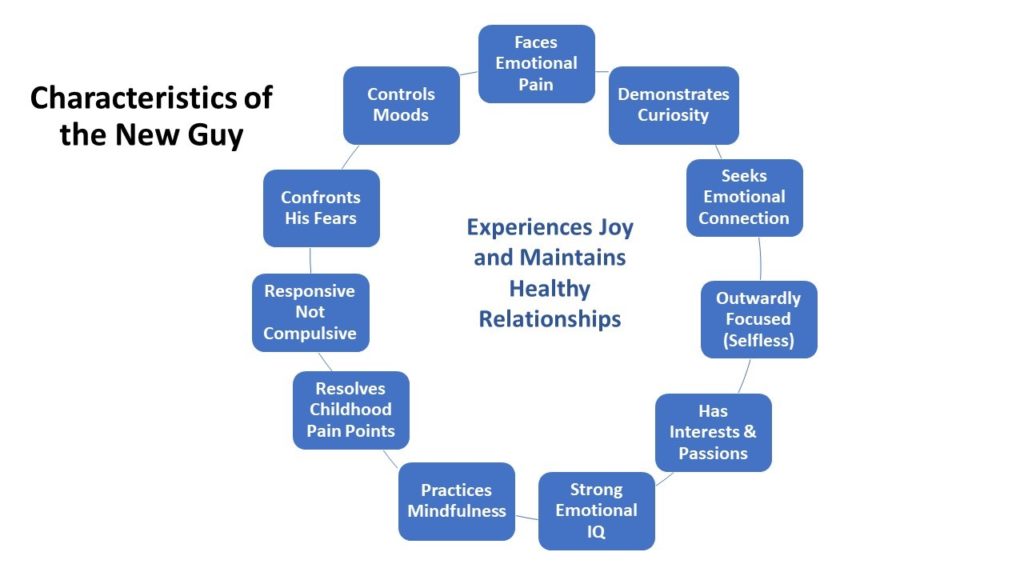
* * * * *
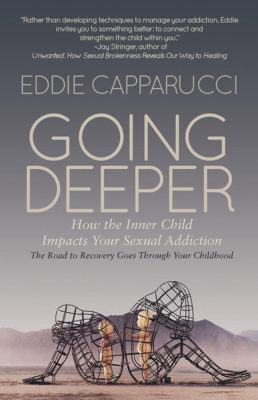 Eddie Capparucci is a Christian therapist and licensed by the State of Georgia. Certified in the treatment of sexual and pornography addiction, and he and his wife, Teri, have a private practice working with men struggling with sexual and pornography addictions, as well as their wives who are dealing with betrayal. Among his many clients, Eddie has worked with professional athletes, including NFL and MLB players and television personalities.
Eddie Capparucci is a Christian therapist and licensed by the State of Georgia. Certified in the treatment of sexual and pornography addiction, and he and his wife, Teri, have a private practice working with men struggling with sexual and pornography addictions, as well as their wives who are dealing with betrayal. Among his many clients, Eddie has worked with professional athletes, including NFL and MLB players and television personalities.
He is the creator of the Inner Child Recovery Process for the treatment of Sexual and Pornography addiction. This unique treatment method helps individuals get to the root issues of their addiction and provides them with the tools and insight to manage the disorder. It has been endorsed by many leaders in the sex addiction field. You can find out more about it at www.innerchild-sexaddiction.com. The Inner Child Recovery Process is the subject of his new book, Going Deeper: How the Inner Child Impacts Your Sexual Addiction. He also is the host of the webcast entitled Getting to the Other Side: Helping Couples Navigate the Road to Recovery.
